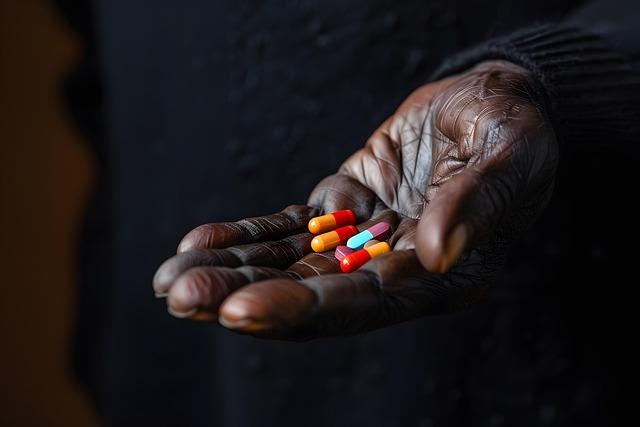In the age of instant information and relentless social media scrutiny, whispers can spread like wildfire—especially when it comes to the personal lives of celebrities and public figures. Among the most persistent and tantalizing rumors are those concerning secret rehab visits, a topic that often blurs the line between fact and fiction. This article seeks to navigate the delicate terrain of these claims, examining how such stories emerge, why they captivate public imagination, and what they reveal about society’s complex relationship with recovery, privacy, and fame.
Table of Contents
- Rumors Unveiled The Impact on Personal Privacy
- The Role of Media in Shaping Perceptions
- Understanding the Stigma Surrounding Rehab Visits
- How Celebrities Navigate Secrecy and Public Life
- Expert Advice on Supporting Loved Ones Through Recovery
- Best Practices for Respecting Confidentiality and Healing Spaces
- Q&A
- Insights and Conclusions

Rumors Unveiled The Impact on Personal Privacy
Speculation about secret rehab visits often triggers a whirlwind of conversations, where truth becomes entangled with curiosity. This frenzy can inadvertently blur the lines between public interest and an individual’s right to confidentiality. While some believe that transparency is necessary, it’s crucial to recognize that personal recovery journeys are deeply private. The rapid spread of unfounded rumors not only amplifies stress but may also discourage individuals from seeking help, fearing public exposure.
In today’s digital age, the impact on personal privacy is profound. Social media platforms and gossip columns act as catalysts, spreading whispers that often lack verification. Below is a quick glance at how rumors affect privacy and mental health:
| Aspect | Effect |
|---|---|
| Emotional Well-being | Heightened anxiety and stress |
| Public Perception | Potential reputation damage |
| Legal Concerns | Violation of confidentiality rights |
When handling rumors, it’s essential to foster an environment of empathy and respect. Encourage discussions that support privacy rather than invade it, understanding that everyone deserves dignity beyond the headlines.

The Role of Media in Shaping Perceptions
Media outlets play a pivotal role in sculpting public opinion by selecting which rumors to amplify and how they frame those narratives. In cases of alleged secret rehab visits, the media often treads a delicate line between investigative reporting and sensationalism. By spotlighting unverified claims, headlines can quickly morph into widespread belief, influencing how audiences perceive the individuals involved. Visual imagery, choice of words, and the frequency of coverage all contribute to crafting a narrative that could either stigmatize or generate sympathy.
Several dynamics underline this phenomenon:
- Confirmation Bias: Media consumers may gravitate towards stories that reinforce their preconceived notions about celebrities or public figures.
- Information Cascades: Early reports, even if inaccurate, can trigger a domino effect, compelling other outlets to follow suit.
- Privacy vs. Public Interest: Striking a balance between an individual’s right to privacy and public curiosity often gets blurred in rumor-driven stories.
| Aspect | Impact on Public Perception | Media Technique |
|---|---|---|
| Headline Framing | Shapes initial emotional response | Use of sensational or ambiguous language |
| Source Credibility | Determines trustworthiness | Referencing anonymous insiders or official spokespeople |
| Visual Elements | Enhances memorability | Photos, videos, or manipulated imagery |

Understanding the Stigma Surrounding Rehab Visits
Many people hesitate to discuss rehab visits openly due to a cloud of misconceptions and hidden judgments. The idea that seeking help is a secretive or shameful act contributes heavily to the stigma surrounding recovery. This stigma often manifests through societal whispers, assumptions about personal failures, or the belief that rehabilitation is a sign of weakness. However, it’s important to realize that rehab is a courageous step towards healing, not a secret to hide. A shift in understanding could break down barriers and encourage more individuals to pursue the support they need.
- Privacy vs. Secrecy: Wanting confidentiality doesn’t equate to shame.
- Support Systems Matter: Awareness can transform judgment into empathy.
- Changing Narratives: Highlighting success stories reduces misconceptions.
| Common Misconception | Reality |
|---|---|
| Rehab is only for severe addictions | It supports many challenges, from mental health to behavioral recovery |
| Attending rehab means failure | It’s a sign of strength and self-awareness |
| People should handle problems privately | Professional help is a wise and effective choice |

How Celebrities Navigate Secrecy and Public Life
In the glittering world of fame, maintaining a private life amidst swirling rumors can be a daunting challenge. Celebrities often face persistent speculation about their personal struggles, especially when whispers of secret rehab visits emerge. Many stars employ a layered approach to managing their privacy—balancing openness about mental health to reduce stigma while vigorously protecting sensitive details from the public eye. By controlling the narrative through carefully timed statements or selectively sharing their journey, they create a protective shield against invasive gossip and laxer media scrutiny.
- Selective Disclosure: Sharing select milestones or recovery updates on their own terms.
- Trusted Inner Circle: Relying on close friends or PR teams to filter information.
- Legal Safeguards: Employing non-disclosure agreements to prevent leaks.
| Strategy | Purpose | Outcome |
|---|---|---|
| Controlled Social Media Posts | Shape public perception | Reduced speculation |
| Private Treatment Facilities | Maintain confidentiality | Preserved anonymity |
| Media Collaboration | Strategic story release | Positive publicity |
Ultimately, the interplay between secrecy and transparency becomes an art form where celebrities navigate safeguarding their dignity without alienating supportive fans. The delicate balance cultivates empathy and understanding while quelling rumor mills, proving that discretion is often the quiet hero behind enduring public success.

Expert Advice on Supporting Loved Ones Through Recovery
Supporting a loved one through recovery is a delicate balance of patience, empathy, and strength. Often, secrecy around rehab visits stems from stigma or a desire for privacy, but it’s vital to remember that trust forms the foundation of healing. Engage in open, non-judgmental conversations that reassure your loved one their worth transcends any struggles. Small gestures like attending support groups or simply listening can transform their journey profoundly. Avoid pressuring them for details or timelines—recovery doesn’t adhere to schedules and forcing disclosure often backfires.
There are practical tactics to help maintain momentum in recovery:
- Educate yourself on signs of relapse and progress to be prepared for changes.
- Celebrate milestones however small, reinforcing positive behavior.
- Respect boundaries—not all details need to be shared for you to show support.
- Avoid enabling, focusing instead on empowerment and accountability.
| Action | Benefit | Tip |
|---|---|---|
| Active Listening | Builds trust and openness | Use reflective responses |
| Consistent Check-Ins | Shows commitment | Keep sessions short but frequent |
| Positive Reinforcement | Boosts motivation | Focus on effort, not just results |

Best Practices for Respecting Confidentiality and Healing Spaces
Maintaining the confidentiality of individuals seeking help in rehab is crucial not only for their privacy but also for fostering an environment where healing can genuinely begin. Respecting the space of recovery means avoiding speculation, gossip, or sharing unconfirmed information, which can cause emotional harm and hinder progress. Confidentiality safeguards trust and promotes a sense of security, ensuring that those in treatment feel supported rather than scrutinized.
Healing spaces thrive on principles that protect and empower the individual. This includes:
- Strict confidentiality agreements among staff and attendees
- Clear guidelines about sharing information publicly
- Encouraging empathy rather than judgment within the community
By adhering to these principles, communities can create a sanctuary where recovery is prioritized over rumor, empowering individuals to reclaim their narratives without fear of exposure.
Q&A
Q&A: Unpacking the Rumors About Secret Rehab Visits
Q1: Why do rumors about secret rehab visits often spread so quickly?
A1: Rumors about secret rehab visits tend to spread rapidly due to public fascination with celebrity lifestyles and the stigma surrounding addiction. When someone well-known appears to disappear from public view or exhibit unusual behavior, speculation fills the void, often fueled by social media and gossip columns eager for attention-grabbing stories.
Q2: Are secret rehab visits actually common?
A2: While maintaining privacy during rehab is important for many individuals, the concept of a “secret” rehab visit is often exaggerated. Clinics and treatment centers typically respect confidentiality, but complete secrecy is challenging in today’s connected world. Some people choose discreet treatment options, but not everyone goes “undercover.”
Q3: What impact do these rumors have on the individuals involved?
A3: Such rumors can be a double-edged sword. On one hand, they can raise awareness about addiction and recovery struggles; on the other, they may invade privacy, cause undue stress, and perpetuate stigma. The court of public opinion often passes judgment, which can hinder a person’s healing process.
Q4: How can readers differentiate between fact and fiction in these stories?
A4: Critical thinking and source verification are key. Reliable information usually comes from official statements, reputable news outlets, or directly from the individuals concerned. Sensational headlines and anonymous sources often signal rumor, so approaching such claims with healthy skepticism is wise.
Q5: What is the broader significance of these rumors in society?
A5: Rumors about secret rehab visits highlight society’s complex relationship with addiction—balancing empathy with curiosity and judgment. They underscore the need for more open conversations about mental health and substance use, promoting understanding rather than speculation.
Q6: How should media outlets ethically handle stories about rehab and recovery?
A6: Media should prioritize accuracy, respect privacy, and avoid sensationalism. Emphasizing hopeful and educational perspectives over scandal helps reduce stigma and supports those on the path to recovery. Responsible reporting can transform rumors into meaningful dialogue.
This Q&A aims to untangle the mystique surrounding secret rehab visit rumors, fostering a more informed and compassionate perspective.
Insights and Conclusions
In the end, rumors about secret rehab visits often reflect society’s complex relationship with privacy, recovery, and public perception. While speculation can be tempting, it’s important to remember that true healing is a personal journey—one that deserves respect beyond the whispers and headlines. Whether these stories hold truth or remain in the realm of rumor, they remind us to approach such topics with empathy, understanding, and a recognition that everyone’s path to wellness is deeply individual and often unseen.

